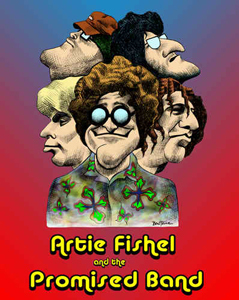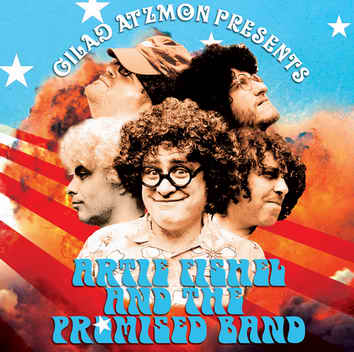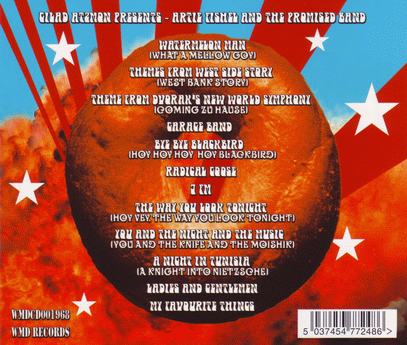"Maybe when you Blend
the Violence will End"
Artie Fishel News: Gilad Atzmon's Latest Album
By Anis Hamadeh, November 25, 2006The sound of this album is happy Arty Phythel's Flying Beatle Bagels on Leninklez Goyboyz. It can be assumed that the involved musicians had a good time recording it. The 18 tracks of "Artie Fishel and the Promised Band" are a comprehensive composition in jazzy Blues Brothers' suits with comedy bits that remind of the tradition of Peter Sellers. The album was recorded at East Cote Studio, Kensal Road, London, mixed by Philip Bagenal, and released on October 23, 2006. Label: Weapons Of Mass Distraction (WMDCD001968). Let's listen through it together!
It starts with "The Mellow Goy", the first in a series of musical persiflages and satires, a reinvention of Herbie Hancock's classic "Watermelon Man" ("What a mellow Goy"), "Goy" being defined in the CD booklet as "A person who fails to be a Jew". It is a piece of funky music with electric guitars and absolutely party and nothing to disagree about. In the Mr. President Interlude (0:21) we learn that President G.W. Push, who happens to have a guest appearance in the overall enterprise, welcomes Artie Fishel and asks him in. The voice of Tom Clark Hill impersonates Push, and there is the whole dialogue on the red promotional bonus CD. On the original album we find the closing bit in track 16 (Jungle Jazz, 0:07), when Push says: "You want me to say that jazz comes from Israel? Well, it comes from Israel." The band plays songs to the president, like an "Amerrrica" version (1:11, track 3) of Bernstein's "West Bank Story" and Dvorak's New World Symphony Theme ("Coming zu Hause", 4:22). On track 5, "Garage Band" (1:43), a Palestinian asks the man from the garage to fix his car right away, as he is in a hurry. But the keeper, another Palestinian, does not have the time. The dialogue is in Arabic and the music an accordion waltz. It is a vivid scene, like a part of a story, only that we don't know the story. An atmosphere. This probably is what John L Walters meant when he wrote in The Guardian: "Atzmon's unblended juxtaposition of music with spoken word satire is more first draft than finished project." Not a finished project, but an unlimited, unfolding world.
The key of the Artie Fishel story is presented in the form of a BBC Radio 7 arts review parody. Harry Palmer alias Tom Clark Hill interviews Artie asking him how he can support the claim that jazz has nothing to do with America. Artie answers: "I can already see that you are a typical classic anti-Semite." The bonus CD has the complete interview. The satire is balanced by the fact that Atzmon's/Fishel's music explores Jewish cultural identities with strong improvisations and arrangements and with the fantastic drummer Asaf Sirkis ("Peter Foreskin"), like in "Bye Bye Blackbird" (Hoy, 2:06), a superb fast Moulin Rouge party tune with spoken comedy insertions and the typical Eastern accent. Not only jazz, but also "Artie in the Sky with Bagel" (0:28) is enthusiastically called "so Jëwish". Track 9, "Radical Goose" (5:14), is free jazz centered around Gilad's famous saxophone, a cosmic, meditative sound with a voice talking in the off in an unknown language. The same saxophone is featured in "I FM" (6:20), a radio parody with the smooth voice of DJ Big Bobby Johnson alias Tom Clark Hill. He introduces "Palestine's finest" Jihad Axman and the Palestinian Funkatirs. But the show gets interrupted by a guy up on the aerial, he disturbs the broadcast and brings in bits of other music, like Jewish folklore. After a while the two parties harmonize their respective sounds and almost play together. This is when Bobby Johnson asserts: "Maybe when you blend the violence will end." It is amazing to get this very message as in former times Gilad had insisted on having overcome Judaism and Jewry. It is not necessarily a contradiction, maybe it even is an explanation. Maybe it is just easier to assimilate and coexist with things and people when they do not bear a label, like "Jewish". Track 11 is an Artie Fishel version of the classic "(Hoy Vey) The Way you Look Tonight" (4:36) with a Jëwish singer and a Jëwish ending. Gilad Atzmon is mimicing the occupation in the most subtle way. In the mostly spoken "Lipstick" (1:22) Artie explains that "we" claim jazz back and people will need a permission to play it.
 Another highlight of the album is the classic "You and the Night and the Music" from 1934, which becomes "You and the Knife and the Moishik" (2:40), a fast, driving tune, featuring Ovad Fretless a.k.a. Ovidiu Fratila on the violin and anarchic spoken insertions. Even more anarchic is "War and Peace" (0:47) where Artie raves about the compassion of his people and about gefilte fish. "A Night in Tunisia" (5:17) by Dizzy Gillespie turns to "A Knight into Nietzsche", because: "when you read Nietzsche it does not take long until you end up listening to Wagner." Track 17, "Ladies and Gentlemen" (3:10), introduces the (of Fishel) members of the Promised Band: apart from the musicians mentioned above they are Yaron Stavi ("Jaco Pastrami") on bass, Eyal Maoz ("Shimshon Gib Shoin") on guitar, John Turville ("McGoy Tyner") on piano and keyboards, Koby Israelite ("Salim Dion"), accordion and vocals. The album closes with the Rogers/Hammerstein classic "My Favourite Things" (2:30), from the musical "The Sound of Music". After that artists like John Coltrane and Dave Brubeck have used this tune, it appears logical that Artie has a version of his own... There is an extra bit that is not listed in the index of the CD contents, after a pause of one minute, a reminiscence of Chinese music, which, says Artie, has nothing to do with the Chinese people...
After "Nostalico", "Exile", and "Musik", Atzmon not only produced a Da Da symphony here, it is a whole cult, with the Fishel website, another website www.myspace.com/artiefishel; you have the video game: www.artiefishel.com/Game/Game.htm, bagels, and, of course, the concerts. Furthermore, a Cyber Shtetle with kosher recipes and links to Jewish websites like a joke site and the IDF. There also are unconfirmed rumors about the upcoming marketing of Artie Fishel underwear as well as AF Dinner Evenings with the International Zionist Bingo Confederation.
Despite or because of its subversion the album and the concerts have been successful in London's jazz scene and press. In his article "Surviving the Board of Deputies", ex-Jew Gilad describes the secret of Fishel's success like this: "Artie is indeed a funny bloke – he is far from being violent; in fact he loves peace, he loves his people, his people love him, but more than anything, he really loves himself. Artie is predominantly an entertainer." And: "Artie Fishel was there to launch a debate, to let people look into Zionism and culture from a different perspective. He's there to let Jews look at themselves with no fear and to let others look into Zionism and cultural colonialism without losing their dignity." |
„Maybe when you Blend
the Violence will End“
Artie Fishel News: Gilad Atzmons aktuelles Album
von Anis Hamadeh, 25.11.2006Der Sound dieses Albums ist ein fröhlicher Arty Phythel's Flying Beatle Bagels auf Leninklez Goyboyz. Man darf annehmen, dass die beteiligten Musiker eine gute Zeit dabei hatten, es aufzunehmen. Die 18 Stücke von „Artie Fishel and the Promised Band“ sind eine umfassende Komposition in jazzigem Blues-Brothers-Anzug mit Comedy-Einlagen, die an die Tradition von Peter Sellers erinnern. Das Album wurde aufgenommen im East Cote Studio, Kensal Road, London, abgemischt von Philip Bagenal und es erschien am 23.10.2006. Label: Weapons Of Mass Distraction (WMDCD001968). Hören wir es gemeinsam durch!
Es beginnt mit „The Mellow Goy“, dem ersten in einer Reihe von Persiflagen und Satiren, einer Neuerfindung von Herbie Hancocks Klassiker „Watermelon Man“ („What a mellow Goy“), wobei „Goy“ laut CD-Booklet definiert ist als „eine Person, die nicht hinreichend Jude ist“. Es ist ein Stück funkiger Musik mit elektrischen Gitarren und absolut Party und nichts, worüber man sich streiten könnte. Im „Mr. President Interlude“ (0:21) erfahren wir, dass Präsident G.W. Push – der eine Gastrolle in dem Gesamtkunstwerk spielt – Artie Fishel willkommen heißt und ihn hereinbittet. Die Stimme von Tom Clark Hill imitiert Push. Der gesamte Dialog ist zu hören auf der roten Promo-Bonus-CD. Das Originalalbum enthält noch den Schlussteil auf Track 16 (Jungle Jazz, 0:07), wo Push sagt: „Du möchtest, dass ich sage, dass Jazz aus Israel kommt? Nun, er kommt aus Israel.“ Die Band spielt Lieder für den Präsidenten, zum Beispiel eine „Amerrrica“-Version (1:11) aus Bernsteins „West Bank Story“ und Dvoraks Thema aus der Neuen-Welt-Symphonie („Coming zu Hause“, 4:22). Im fünften Stück, „Garage Band“ (1:43), bittet ein Palästinenser den Mann von der Werkstatt, sein Auto gleich zu reparieren, weil er in Eile sei. Aber der Inhaber, auch ein Palästinenser, hat keine Zeit. Der Dialog ist auf Arabisch und die Musik ein Akkordeon-Walzer. Es ist eine lebendige Szene, wie der Teil einer Geschichte, die man nicht kennt. Eine Atmosphäre. Das ist es wahrscheinlich, was John L Walters meinte, als er in der Zeitung The Guardian schrieb: „Atzmons ungemischte Gegenüberstellung von Musik und gesprochenem satirischem Wort ist eher ein erster Entwurf als ein fertiges Projekt.“ Kein fertiges Projekt, sondern eine nicht begrenzte, sich entfaltende Welt.
Der Schlüssel der Artie-Fishel-Geschichte wird in Form einer BBC-Radio-7-Arts-Review-Parodie präsentiert. Harry Palmer alias Tom Clark Hill interviewt Artie und fragt ihn, wie es sein kann, dass er behauptet, dass Jazz nichts mit Amerika zu tun habe. Artie antwortet: „Ich kann jetzt schon sehen, dass Sie ein typischer, klassischer Antisemit sind.“ Auf der Bonus-CD ist das gesamte Interview. Die Satire wird dadurch ausgeglichen, dass Atzmons/Fishels Musik mit starken Improvisationen und Arrangements jüdische kulturelle Identitäten erforscht. Dazu kommt der fantastische Schlagzeuger Asaf Sirkis („Peter Foreskin“), zum Beispiel in „Bye Bye Blackbird“ (Hoy, 2:06), einem ausgezeichneten schnellen Moulin-Rouge-Party-Stück mit gesprochenen Comedy-Einschüben und dem typischen östlichen Akzent. Nicht nur Jazz, auch „Artie in the Sky with Bagel“ (0:28) wird schwärmerisch „so jüdisch“ genannt. Stück 9, „Radical Goose“ (5:14), ist Free Jazz mit Gilads berühmtem Saxofon im Zentrum, ein kosmischer, meditativer Sound mit einer Off-Stimme, die in einer unbekannten Sprache spricht. Dasselbe Saxofon spielt die Hauptrolle in „I FM“ (6:20), einer Radio-Parodie mit der sanften Stimme von DJ Big Bobby Johnson alias Tom Clark Hill. Er stellt „Palestine's finest“ Jihad Axman vor und die Palestinian Funkatirs. Aber die Show wird von einem Typ unterbrochen, der oben an der Antenne dreht, er stört die Übertragung und bringt Fetzen von anderer Musik hinein, wie jüdische Folklore. Nach einer Weile stimmen die beiden Parteien ihre jeweiligen Sounds aneinander ab und spielen fast zusammen. Dies ist die Stelle, an der Bobby Johnson feststellt: „Maybe when you blend the violence will end.“ („Vielleicht hört die Gewalt auf, wenn man die Dinge mischt.“) Es ist erstaunlich, gerade diese Botschaft zu erhalten, da Gilad früher darauf bestanden hat, das Judentum überwunden zu haben. Das ist nicht unbedingt ein Widerspruch, vielleicht ist es sogar eine Erklärung. Vielleicht ist es einfach leichter, Dinge zu assimilieren und mit Menschen zu koexistieren, wenn sie keine Etiketten tragen, wie etwa „jüdisch“. Track 11 ist eine Artie-Fishel-Version des Klassikers „(Hoy Vey) The Way you Look Tonight“ (4:36) mit einem jüdischen Sänger und einem jüdischen Schluss. Gilad Atzmon imitiert die Besatzung auf die subtilste Weise. Im hauptsächlich gesprochenen „Lipstick“ (1:22) erklärt Artie, dass „wir“ den Jazz zurückverlangen und dass es eine Genehmigungspflicht geben wird, wenn andere ihn spielen möchten.
Ein weiteres Highlight des Albums ist der Klassiker „You and the Night and the Music“ von 1934, aus dem „You and the Knife and the Moishik“ (2:40) wird, ein schnelles, treibendes Stück, mit Ovad Fretless a.k.a. Ovidiu Fratila an der Geige in der Hauptrolle und mit anarchischen gesprochenen Teilen. Noch anarchischer ist „War and Peace“ (0:47), wo Artie vom Mitgefühl seiner Leute schwärmt und von Gefilte Fisch. „A Night in Tunisia“ (5:17) von Dizzy Gillespie wird zu „A Knight into Nietzsche“, denn: „Wenn man Nietzsche liest, dauert es nicht lange, bis man Wagner hört.“ Stück 17, „Ladies and Gentlemen“ (3:10), stellt die Mitglieder der Promised Band vor: Abgesehen von den bereits erwähnten Musikern handelt es sich um Yaron Stavi („Jaco Pastrami“) am Bass, Eyal Maoz („Shimshon Gib Shoin“) an der Gitarre, John Turville („McGoy Tyner“), Piano und Keyboard, Koby Israelite („Salim Dion“), Akkordeon und Gesang. Das Album endet mit dem Rogers/Hammerstein-Klassiker „My Favourite Things“ (2:30), aus dem Musical „The Sound of Music“. Nachdem bereits Künstler wie John Coltrane und Dave Brubeck dieses Stück verwendet haben, erscheint es logisch, dass Artie eine eigene Version davon hat... Es gibt nach einer Minute Pause ein zusätzliches Stück, das nicht im Inhaltsverzeichnis steht, eine Reminiszenz an chinesische Musik, die, so Artie, nichts mit dem chinesischen Volk zu tun hat ...
Nach „Nostalico“, „Exile“, und „Musik“ hat Atzmon mit dieser CD nicht nur eine Dada-Symphonie produziert, sondern einen ganzen Kult, mit der Fishel-Website, einer weiteren Website www.myspace.com/artiefishel; es gibt das Videospiel: www.artiefishel.com/Game/Game.htm, Bagels, und natürlich die Konzerte. Darüber hinaus gibt es ein Cyber-Shtetle mit koscheren Rezepten und Links zu jüdischen Websites wie einer Witzeseite und der IDF. Dazu kommen unbestätigte Gerüchte über die Vermarktung von Artie-Fishel-Unterwäsche und AF Dinner-Abende mit der Internationalen Zionistischen Bingo-Konföderation.
Trotz oder wegen seiner Subversion sind das Album und die Konzerte in Londons Jazz- und Presseszene erfolgreich. In seinem Artikel „Surviving the Board of Deputies“, beschreibt der ex-Jude Gilad das Geheimnis von Fishels Erfolg so: „Artie ist wirklich ein komischer Typ – er ist weit entfernt davon, gewalttätig zu sein; tatsächlich liebt er den Frieden, er liebt sein Volk, sein Volk liebt ihn, aber mehr noch als alles andere liebt er sich selbst wirklich. Artie ist in erster Linie ein Entertainer.“ Und: „Artie Fishel wurde erfunden, um eine Debatte anzuregen, um Leuten die Möglichkeit zu geben, Zionismus und Kultur aus einer anderen Perspektive zu betrachten. Er ist da, damit sich Juden ohne Furcht selbst sehen können und um andere den Zionismus und Kulturkolonialismus betrachten zu lassen, ohne dass sie ihre Würde verlieren.“ |




